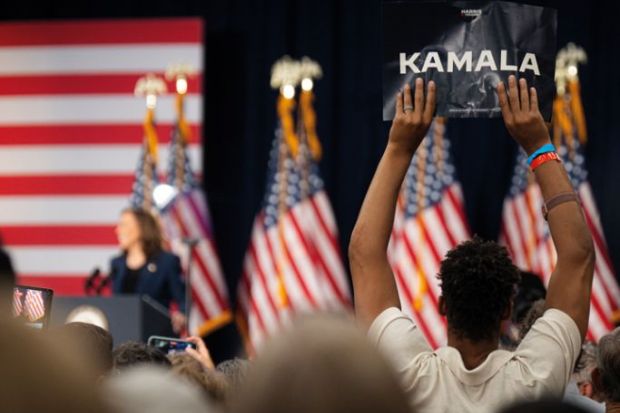Kamala Harris’ focus on the youth vote could be good news for universities, according to experts, but she faces an “opportunist” rival in J. D. Vance, whose anti-intellectualist rhetoric could prove to be highly influential.
Ms Harris, the most likely Democratic presidential nominee after Joe Biden withdrew from the race, would not offer anything “radically different” in her policies from the outgoing president, according to Mark Shanahan, associate professor of political engagement at the University of Surrey, but she was making a much more “overt play for younger voters”.
Dr Shanahan said her record as California’s attorney general showed a focus on value for money in higher education, and an opposition to unregulated for-profit providers.
During her time in the Senate, Ms Harris displayed support for free community college, and as vice-president she has backed the Biden administration’s student loan forgiveness plan.
As president, she could propose a “pretty radical overhaul of the whole student loan model”, as well as provide greater support for both state institutions and for historically black colleges and universities (HBCUs), Dr Shanahan said.
“If she differs at all from Biden, it will be in this laser focus on the young, on minorities and on women. If higher education can position in the centre of that particular Venn diagram, it will do well from a Harris presidency.”
The Biden administration has been a vocal backer of HBCUs, and Ms Harris’ degree from Howard University means that she would become the first HBCU graduate to sit in the Oval Office if she is elected.
Historically, there had been little to separate the two main political parties on the issue of higher education, but they have diverged as Republicans have pressed to roll back financial access, to close the Department of Education and to control curricula, said Jennifer Steele, a professor in the School of Education at American University.
Dr Steele said she would expect a Harris presidency to continue to support loan forgiveness and to look to expand Pell Grants, the main federal subsidy for low-income college students.
She said the US sector should be excited by a Harris candidacy because her “biography is very compelling” for those who work in education – her parents met after immigrating to the US to pursue doctoral degrees.
Her father became an economist and professor emeritus at Stanford University, while her mother was a molecular biologist at the Lawrence Berkeley National Laboratory.
Dr Steele said Mr Vance, a senator, author and Donald Trump’s choice as vice-presidential running mate, also has a life story that shows the “deep value of education and what it makes possible”. In Mr Vance’s breakthrough memoir, Hillbilly Elegy, he describes how he was transformed from his working-class upbringing in the Midwest by his experience at Ohio State University and Yale University.
But since then, Mr Vance has become a vocal critic of higher education, labelling colleges “the enemy” in speeches and proudly championing “anti-intellectualism”, according to Benjamin Hett, a history professor at CUNY Hunter College and City University of New York.
But Professor Hett said Mr Vance’s ability to impact higher education as vice-president would be limited by the country’s federal system, and that as an “opportunist” he was less dangerous than a “sincere fire-breathing ideologue”.
Where Mr Vance could make a difference, Professor Hett said, was in influencing the policies of state governments, “who really do have levers of power over higher education to take measures, as they are already doing”.
Register to continue
Why register?
- Registration is free and only takes a moment
- Once registered, you can read 3 articles a month
- Sign up for our newsletter
Subscribe
Or subscribe for unlimited access to:
- Unlimited access to news, views, insights & reviews
- Digital editions
- Digital access to THE’s university and college rankings analysis
Already registered or a current subscriber? Login








